The lake management calendar: maintaining your dream pond throughout the year
By Matt Ward
Managing your pond or lake to maximize its potential is a year-round endeavor. Careful pond cultivators follow a calendar outlining the best activities to pursue each month.
In our region, that calendar starts and ends the year with the least amount of upkeep, and surges with mid-year responsibilities. Regardless of the list length, however, each of these fishery management obligations is important to keep your dream fishing hole at its highest quality.
The Texas A&M AgriLife Extension recommends a calendar based on management, stocking, reproduction, feeding, harvesting, and drawdown, if possible.
Following is a calendar outline illustrating how smart lake and pond owners take care of their investments:
Year-round
There are a few things you can easily do year-round, such as building or renovating a pond or lake, pond water testing, harvesting excess or undersized bass or undesirable species, and clearing muddy water.
January
This month is the time to focus on agricultural limestone applications, which regulate the pH levels that are critical to fish growth and reproduction. Ponds should be tested before stocking, and Texas A&M recommends that you use the same lime used on your pastures and meadows. Lime additions are recommended from October-February.
January is also a time to focus on supplemental and new forage stocking. Pond stocking is an important part of any lake management program and requires skill and precision to ensure the results live up to your expectations and can be maintained over the long term. Determining what fish will work best for you involves many variables, including your goals and the size of your pond and lake. Fish stocking is recommended from September-June.
February
This month sees largemouth bass spawning begin and continue through April.
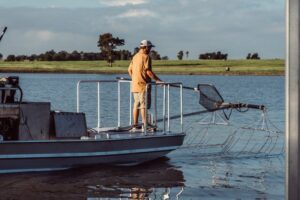
Also this month, experts recommend you begin scheduling electrofishing surveys, which are an excellent tool for correcting an out-of-balance pond and planning pond stocking. Electrofishing surveys accurately assess current forage and sport fish populations and help you to assess any wintertime damage quantify from cormorants or otter. Fish populations also are sampled to determine species, size, relative abundance and growth rates.
Experts use a top-of-the-line electrofishing boat to identify stunted fish or unwanted species, which can be easily and quickly removed as part of this service. An electrofishing survey is a standard scientific survey method that causes no long-term negative effect to the fish population in your pond or lake.
Performed correctly, the fish are stunned briefly; examined for species to determine abundance, population density, weights and measurements; and then quickly returned to their normal state.
An electrofishing survey is the reference point for a long-term fishery management plan, providing clues for corrective pond stocking and harvest recommendations. Experts recommend electrofishing surveys from February-June and September- November.
March
This month, experts recommend starting supplemental feeding of forage fish, catfish, hybrid striped bass and feed-trained bass.
Supplemental feeding greatly increases the weight of particularly catfish and bluegill. In managed lakes, there is more pond stocking and less available habitat and resources, therefore calling for this feeding. Supplemental feeding is recommended March-November.
Also this month, good managers begin pond weeds control and fertilization. Fertilization promotes the growth of phytoplankton, which are the foundation of aquatic ecosystems. 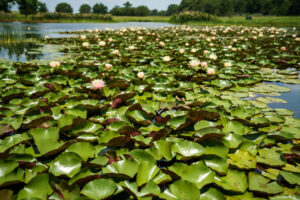 Fertilization is recommended from March-September.
Fertilization is recommended from March-September.
Texas A&M experts suggest that as you ponder the various ways to address pond weed control that you consider using triploid grass carp as a biological control treatment if plants they treat are present; and initiating herbicide weed control when growth begins around this time. Spot treatments of pond weeds are recommended in hot weather to avoid oxygen depletion. Control of pond weeds should be addressed from March-November, depending on your region.
April
This month will see the beginning of fingerling bass pond stocking, which goes through June.
May/June
Bluegill spawn during these two months and smart pond and lake owners may want to consider habitat enhancements to facilitate this.
These months are also part of the optimal time to conduct pond renovations, though they can be done throughout the year. Such renovations can include addressing dam leaks, drains, sediment, flats or shallow areas that are leading to undesirable growth of pond weeds, and other environmental problems.
July/August
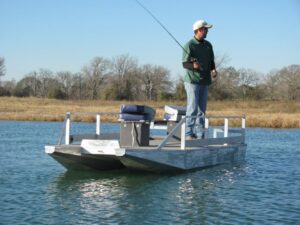 These months are the best time to just chill out and enjoy your lake or pond if you’ve been on top of your fishery management needs.
These months are the best time to just chill out and enjoy your lake or pond if you’ve been on top of your fishery management needs.
If not, this is still the time to address supplemental feeding, aquatic weed control, and fertilization.
September-December
If not already addressed this year, now is the time to schedule supplemental and new forage stocking, lime addition and new electrofishing surveys.
While this schedule of monthly fishery management tasks is a good general guide, you need to evaluate your specific goals and conditions to maximizing the quality of your pond or lake year-round. At Lochow Ranch Pond & Lake Management, our team can offer expert pond management advice to make the most of your dream pond.
Why Choose Lochow Ranch
Serving Texas, Oklahoma, Arkansas and Louisiana, Lochow Ranch Pond & Lake Management proudly puts more than two decades of experience to work for you. Our team includes biologists, technicians and other professionals with deep expertise in pond and lake management services.
Check us out if you are considering building a lake, looking for pond stocking services, buying fish for a pond, or getting professional pond management and maintenance or fishery management. Our services include lake design, pond construction, pond renovation, pond water testing, electrofishing, pond stocking, control of pond weeds, and pond liming and fertilizing. Let us help you build your dream pond that will delight your family and friends for generations to come.
Click here to get in touch to get started today.
Matt Ward is a Fishery Biologist for Lochow Ranch Pond & Lake Management. He has a Master of Science in Biochemistry from Texas A&M University and has worked in fisheries management in Texas for 15 years. He brings a passion for good science and an interdisciplinary approach to the natural sciences to help property managers steward their aquatic resources and achieve management objectives.
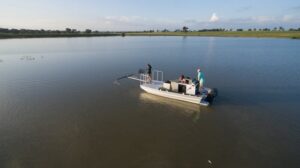
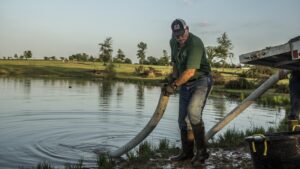 What kinds of fish will work best in your body of water involves many variables, including your own goals for your pond or lake. For example, you need to carefully assess the impact of introducing non-native species into your pond. It’s important to be aware of the fish types that can live together in harmony so your pond can sustain a healthy eco-system.
What kinds of fish will work best in your body of water involves many variables, including your own goals for your pond or lake. For example, you need to carefully assess the impact of introducing non-native species into your pond. It’s important to be aware of the fish types that can live together in harmony so your pond can sustain a healthy eco-system.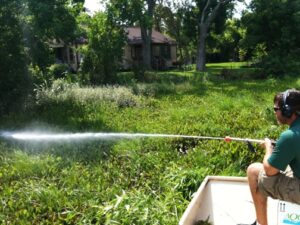
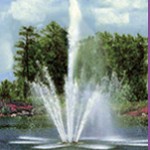 In order to avoid catastrophe, pond and lake owners currently should be inspecting aeration and
In order to avoid catastrophe, pond and lake owners currently should be inspecting aeration and 
Recent Comments